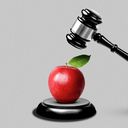Biden administration's slew of antitrust suits leaves Big Tech unbowed

The U.S. government wants to stop Big Tech from parlaying its control of present-day platforms into power over the future — but the giants haven't gotten the message.
The big picture: The Justice Department's major new case against Apple, filed Thursday, completes the Biden administration's quartet of antitrust lawsuits aimed at the companies that have defined the tech industry's last 20 years.
- With another DOJ case against Google and FTC cases against Facebook and Amazon all proceeding in parallel, the Biden antitrust game is now a full-court press.
- These suits are rooted in the competitive battles that shaped the internet, the smartphone and the social media industries. But the officials responsible for bringing them have made clear they're also aimed squarely at the nascent AI future.
"Competition does not just protect the markets and technologies of today, but the innovations of tomorrow," assistant attorney general Jonathan Kanter said Thursday.
- "We bring this case to make sure that Apple competes by innovating rather than by imposing rules and fees that prevent others from innovating and competing too. In so doing, we protect the market for the innovations that we can't yet perceive."
Yes, but: Government lawsuits haven't made tech's trillion-dollar titans any shyer about gobbling up smaller companies in the emergent AI field, though the firms may adjust their tactics.
- Just this week Microsoft effectively acquired Inflection AI, one of the highest-profile startups developing AI models and chatbots that compete with Microsoft partner OpenAI.
- Instead of purchasing the startup, Microsoft simply hired its leadership and much of its talent, while arranging a $650 million licensing deal that some experts suggest was specifically designed to avoid antitrust regulation.
The tech giants are also tapping one another's AI work — with reports this week of a deal by Apple to license Google's Gemini AI model for the next generation iPhone.
- These talks don't seem to have been deterred by the proceedings in another federal trial involving Google and Apple, where a judge is now weighing his ruling.
- That case, centering on Google's dominance of the search market, is based in part on the terms of an Apple deal making Google's search an iPhone default.
Zoom out: The new Apple suit catches the company at a moment of unusual vulnerability.
- Sales of iPhones have plateaued, the fate of the new Vision Pro headset is unclear and Apple has so far brought up the rear of the generative AI parade.
The other side: Apple sits on an Everest of cash, and can view even an expensive legal defense — or massive fines like those regularly imposed by the EU — as a bearable cost of doing business.
- The real danger to tech's dominant firms comes in the form of so-called structural remedies — rulings that require companies to substantially change how they do business or to sell off or split up their products and divisions.
Flashback: Structural remedies are rare in the annals of U.S. antitrust.
- Courts broke up Standard Oil a century ago and AT&T 40 years ago, but they've resisted the move in most tech cases since.
- In 2000, Microsoft faced a trial judge's ruling that it must separate its applications and its operating system businesses, but the order was overturned on appeal.
The bottom line: Glacial antitrust trials have done little so far to limit the wealth and power of tech's biggest companies. The newest addition to the litigation onslaught faces similarly long odds.
Editor's note: This story has been corrected to say that the breakup of AT&T happened 40 years ago (in 1982), not 50 years ago.